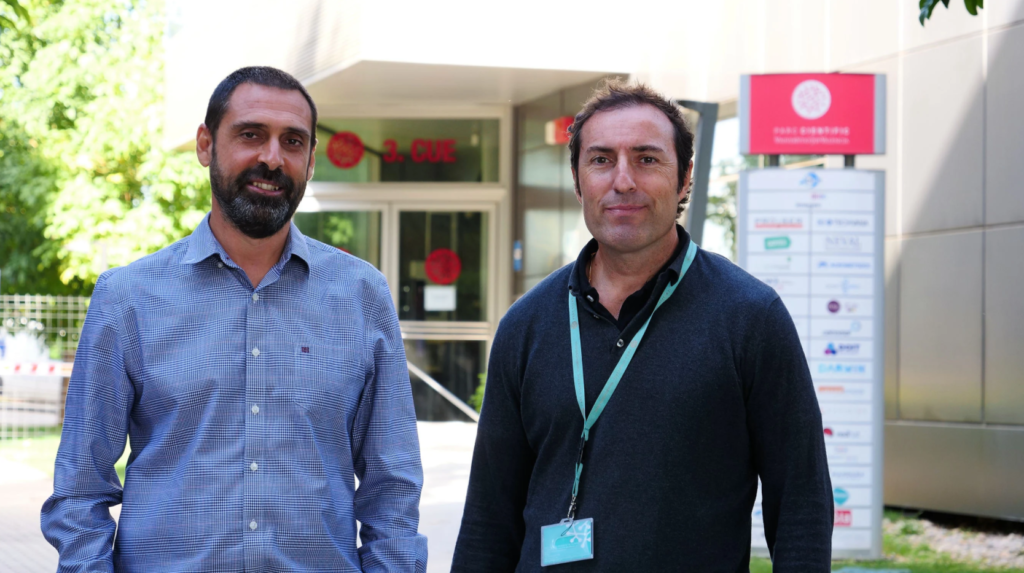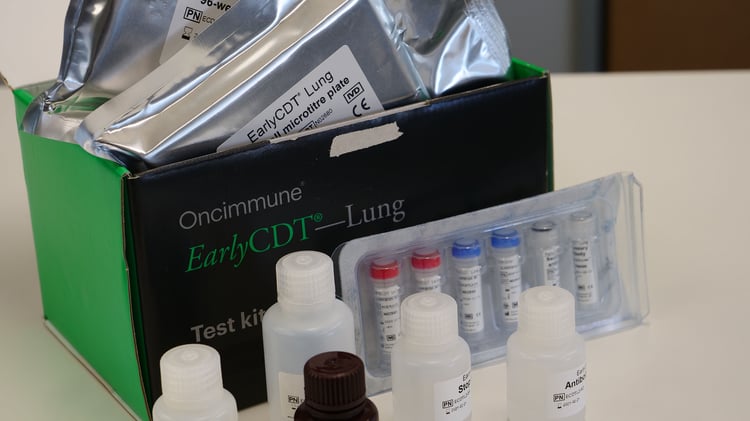
Sabartech adds new support in the generation of its intelligent genetic algorithm for optimization in preventing and detecting diseases through a Research and Development Project granted by the CDTI
Advances in the early detection of lung cancer are becoming more and more a reality in the Spanish health system. Aragón officially becomes the second autonomous community to incorporate the EarlyCDT-Lung test, Sabartech’s pioneering test, into its portfolio of health services as a diagnostic tool for the detection of bronchogenic neoplasms in peripheral blood. The incorporation of this liquid biopsy promoted by the University of Valencia Science Park company follows in the footsteps of its implementation last October at the A Coruña University Hospital Complex (CHUAC), the first public hospital to adopt its portfolio of services this test for the management of indeterminate pulmonary nodules.
The evaluation process as a new health technology, which has had the local collaboration of BESTMEDIC, culminates in the favorable report of the Aragonese Health System Evaluation Commission, by meeting the consistency criteria (relevance, coherence, equity), organization (feasibility, positive impact on the organization) and scientific-technical criteria (efficacy and effectiveness, scientific evidence, efficiency, safety and substitution). The approval has materialized with the publication of the order of the Minister of Health to update the Health Services Portfolio of Aragon to incorporate the Sabartech test as a new diagnostic technique in the Thoracic Surgery Unit of the Miguel Servet University Hospital.
«The fact that there is an official document of these characteristics represents an important milestone and reinforces the introduction of the test in other Autonomous Communities, since the document reflects that there has been an evaluation of the technology and a favorable report from an Evaluation Commission of a Health System”, celebrate Javier Sarasqueta and Javier Escobar, CEO and CSO of Sabartech, respectively.
 Sabartech EarlyCDT-Lung test. Photo: FPCUV
Sabartech EarlyCDT-Lung test. Photo: FPCUVWith an average specificity greater than 90%, close to 99% when autoantibody levels are high, EarlyCDT-Lung shows an extraordinary ability to detect nodules with the highest risk of malignancy, especially among all those that have previously shown an intermediate risk ( between 10-70% calculated by the Brooks, Herder or Mayo model) and with a size that is too small (6-15mm), even motivating the decision-making of the clinical team towards a more aggressive intervention than the one previously performed.
“This ability and capacity of the test is what is convincing thoracic surgeons such as Dr. Javier García Tirado, head of the thoracic surgery service at the Miguel Servet HU, who has promoted the introduction of a diagnostic tool in his hospital for his usual clinical practice. It also has the support of Dr. Pablo León, head of the Thoracic Surgery Service of the University Hospital Complex of Albacete, a center that is undergoing bureaucratic procedures to follow A Coruña and Zaragoza, and current president of the Spanish Society of Thoracic Surgery (SECT)”, says Sarasqueta, CEO of Sabartech.
“These advances are helping us to acquire very valuable know-how to identify the channels for introducing a new technology or procedure in public health, a long road full of obstacles”, Javier Escobar, scientific director of Sabartech.
After a three-year process, in addition to reaching the health systems of Galicia and Aragon, the introduction of the liquid biopsy is well advanced in Castilla La Mancha and Andalusia, where it is found in the portfolio of analytical tests after passing the coding process in the analytical test catalog of the Nomenclature and Coding Group (GNC) of Diraya, coordinated by Dr. Felix Gascón, Director of the Management Unit of the Clinical Laboratory of the North Sanitary Area of Córdoba. The PCUV company also promotes the DEFINE (Diagnostic Evaluation and Follow up of Indeterminate Nodules using EarlyCDT) clinical trial led by Juan Carlos Trujillo, thoracic surgeon at the Hospital de la Santa Creu i San Pau in Barcelona and Co-coordinator of the CASSANDRA study (Cancer Screening Smoking Cessation & Respiratory Assessment),
The introduction of the EarlyCDT-Lung as a diagnostic tool in the Spanish health system aims to contribute to early detection and the chances of survival of those affected. “We hope that soon, just as citizens from other regions such as Scotland have already benefited, anyone in our country suspected of having lung cancer can benefit from this technological advance,” says Escobar, scientific director of Sabartech, who adds: “These advances are helping us to acquire very valuable know-how to identify the channels for introducing a new technology or procedure in public health, a long road full of obstacles.”
New CDTI Research and Development Project
The news coincides with a new financial support. The Center for Industrial Technological Development of Spain (CDTI), a public entity for the promotion of innovation and technological development of Spanish companies, has just awarded a new Research and Development Project (PID) to Sabartech. The funding will boost the R&D activity of this biotechnological company installed in the Parc, and specifically, the generation of its Intelligent Genetic Algorithm, a technology that will make it possible to more quickly and accurately characterize interactions with an impact of the genotype and the phenotype in the prevention, detection and treatment of diseases.
The aid granted by the CDTi will serve to finance the development of a genomic pipeline that will integrate high-throughput genotyping – the process of determining the genotype of a specific DNA variant of a biological organism – of genetic variants and machine learning and mining tools of data, elements that make up the basis of the new algorithm and the new generation preventive genetic tests that the company has already begun to develop.
This recognition is added to the NEOTEC project of the same organization during 2018 and 2019, with the aim of promoting various tests applied to various fields such as food intolerances, sports performance, the prevention of metabolic and cardiovascular disorders, nutritional and sports supplementation, hepatic detoxification or compatibility with drugs commonly used for different specialties or with chemotherapeutic drugs commonly used in cancer treatment.
“With the implementation of this new technology, we strengthen our position in the genetics sector with the aim of integrating different layers of information (genetic, clinical, anthropometric or sociodemographic) to develop models for prediction, prevention, diagnosis, treatment and monitoring of diseases or conditions, much more reliable and precise than the current ones”, Escobar highlights.





